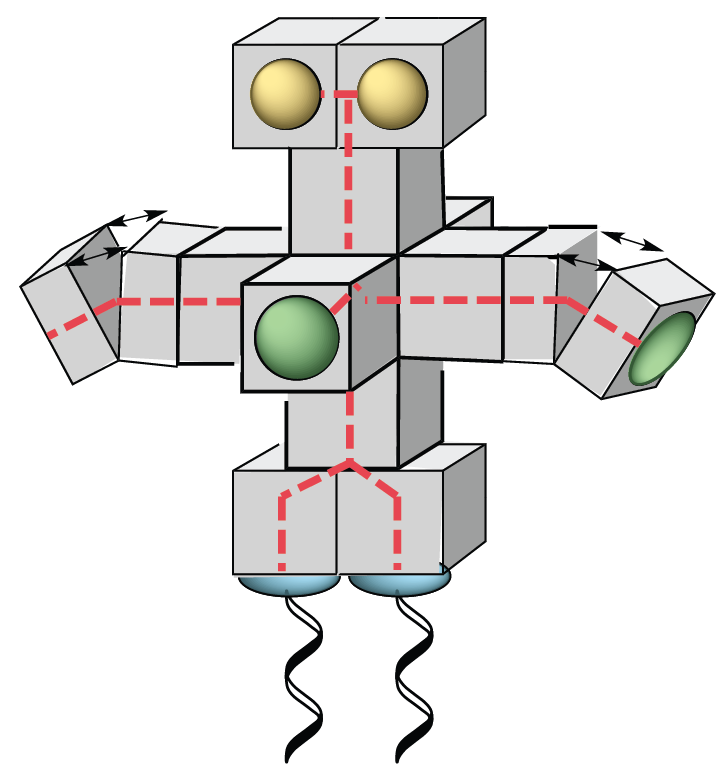New European network on DNA-based nanorobotics coordinated by Aarhus University
Marie Skłodowska-Curie Actions has funded new consortium, headed by professor Kurt Gothelf at the Interdisciplinary Nanoscience Center, with 4 million euro. Through the training of 15 PhD students the aim is to pave the way for the creation of DNA-based robots.

One of the major visions of nanotechnology is to create nanorobots that can navigate and solve tasks at the nanoscale. Robotic systems essentially comprise sensors and mechanisms connected to and coordinated by an information-processing unit. These are the principles that we know from human-scale robots that currently transform the way we work and live. With the recently started European network DNA-Robotics, 12 European organisations will take the first steps to scale advanced robotic behavior to the molecular scale for future medical and technological applications.
DNA-Robotics is an Innovative Training Networks (ITN) under Marie Skłodowska-Curie Actions (H2020) and the partners come from academic institutions and industry in Denmark, United Kingdom, Sweden, Germany and Italy. It is the second time that professor Kurt Gothelf is awarded this highly prestigious grant. His previous ITN, European school of DNA Nanotechnology (EScoDNA) just ended in 2017.
The new network brings together leading research groups in DNA nanotechnology in Europe to collectively develop an integrated and modular robotic platform and demonstrate applications of the novel technology. DNA-based construction is a natural modular platform, which via the programmability of sequence design and self-assembly allows different structural and functional motifs to be flexibly combined. DNA modules will be developed with a range of novel functions for sensing, actuation and intra-system communication and computing, implementing all of the typical components required for a robotic system at the molecular level.
Another very important aim is to create a high-quality interdisciplinary research training program designed to enhance the career prospects of 15 PhD students who will be employed at the partners (cf. the list below). These PhD students will be trained to develop functional modules, which in close collaboration among the PhD students and partners will be assembled to advanced molecular robots.
Professor Kurt Gothelf says: “DNA-Nanotechnology has evolved impressively over the past 10 years and it has now become so sophisticated in terms of our ability to design structures and implement function, that we can start making primitive robots. With DNA-Robotics we have assembled the leading research groups in Europe to join forces for the development of a common design platform for such robots and education of next generation of PhD students in this field.”
The highly interdisciplinary research and training program will exploit the synergy between the different competences of the Partners. The innovative and applied focus is supported by the involvement of the company ATDBio that will also host a PhD student. Furthermore, five companies as are involved as partner organisation that will also provide complementary skills training and intersectoral exposure of the PhD students who are to be employed in the network.
Facts:
Project period: 48 months (starting 1 January 2018)
Project budget: EUR 4.000.000
Partners:
- Professor Kurt Gothelf, Aarhus University (Coordinator)
- Associate professor Ebbe S. Andersen, Aarhus University.
- Professor Tim Liedl, Ludwig-Maximilians-Universität Munich, Germany
- Professor Friedrich C. Simmel, Technical University of Munich, Germany
- Professor Hendrik Dietz, Technical University of Munich, Germany
- Associate professor Björn Högberg, Karolinska Institutet, Sweden
- Professor Andrew Turberfield, University of Oxford, United Kingdom
- Associate professor Francesco Ricci, University of Rome Tor Vergata, Italy
- Director Tom Brown, ATDBio Ltd., United Kingdom
Partner Organisations:
- Dr. Thomas Frischmuth (CEO), Baseclick GmbH, Germany
- Dr. Birgit Graf (Head of Business Development and Marketing), Baseclick GmbH, Germany
- Jakob Karaffa (Director of Operations), LGC Biosearch Technologies, Denmark
- Dr. Joseph Schaeffer (Principal Research Scientist), Autodesk, US
- Adjunct professor Fredrik Frejd (CSO), Affibody AB, Sweden
- Dr. Andrew Phillips (Head of Bio Computation Group), Microsoft Research, United Kingdom
- Professor Luca Cardelli (Principal Researcher), Microsoft Research, United Kingdom
Other information:
Website of the network: https://dna-robotics.eu/
Read also the about DNA based nanorobotics in this article in the popular science newsletter (RØMER) at Science and Technology, Aarhus University (in Danish only):
http://scitech.au.dk/roemer/3-17/nanorobot-kontrollerer-enzymer/
Contact:
Professor and Coordinator, Kurt Vesterager Gothelf
Interdisciplinary Nanoscience Center (iNANO) and Department of Chemistry
+45 60 20 27 25
ITN manager, Ditte Høyer Engholm
Interdisciplinary Nanoscience Center (iNANO)
+45 93 50 87 36
